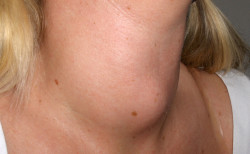Goiter – What foods should you avoid?
Goiter is an abnormal swelling of the thyroid gland and the surrounding tissue. It may be associated with hyperthyroidism (toxic goiter), hypothyroidism or nodules (nodular goiter). Thyroid enlargement occurs due to inflammation, tumors, autoimmune diseases or iodine deficiency.
Contents
Medical Treatment of Goiter
Treatment depends on the cause of the disease and size of the gland.
- Synthetic Thyroid Hormone Replacement (Levothyroid): in cases with hypothyroidism.
- Radioactive iodine (iodine-131): used to treat cases with hyperthyroidism.
- Corticosteroids and NSAIDs are used in cases of thyroiditis.
- Lugol’s iodine or potassium iodine solutions are used in iodine deficiency goiter.
- Ethanol infusion into the nodules in nodular goiter.
- Thionamides: reduce the amount of hormones secreted by thyroid gland.
- Surgery: Total or partial thyroidectomy in thyroid cancer or multinodular goiter.
Alternative Approaches/ Home Remedies of Goiter
- Watercress: has high amount of iodine, sulfur, germanium and antioxidant vitamins. Crush watercress to make its paste then apply it on your neck for 15-20 minutes then wash with water to reduce swelling.
- Dandelion leaves: Crush the dandelion leaves with water to make a paste then apply it over the swollen area for 15-20 minutes and do this daily for at least 2 weeks.
- Coconut oil: contains anti-viral, anti-bacterial and anti-protozoa properties. You can use it as vegetable oil for cooking or add it to smoothies, tea and coffee.
- Liver tonic: bring one handful dandelion greens+3 carrots+1/2 cucumber and lemon+ ginger root.
- Green tea is high in antioxidants and fluoride so have 3 cups of green tea every day.
- Ice bag can be applied to the throat for 20 to 30 minutes to reduce swelling.
- Exposure to early sunshine for about 15 minutes daily is a good way to generate the vitamin D required by the body.
- Increase duration of your sleep.
Balance your diet
Here are some foods you should eat
- Fresh fruits and vegetables: Specific foods such as blueberries, cherries, squash, sweet potatoes, and green peppers are rich in antioxidants, nutrients that bring the thyroid gland into balance. Avocado and potatoes are great source of tyrosine. Tomato also is high in selenium which regulates thyroid hormone production so include either fresh fruit or vegetables at each meal.
- Iodine and selenium rich foods like iodized salt, seafood, mushroom, cod, milk, shrimps and tuna.
- Seaweed: has a high concentration of iodine which is the precursor of thyroid hormone.
- Foods high in vitamin B: meat, dairy products, salmon, grapes, watermelon and guavas.
- Dairy products: There is an association between vitamin D deficiency and Hashimoto’s disease. Milk has significant amounts of calcium, vitamin D, proteins, and iodine.
- Bananas stimulate the thyroid gland.
Foods to avoid
- Goitrogens: produce thiocyanate which decreases thyroid production. Goitrogenic foods include cassava, lima beans, maize, bamboo shoots, and sweet potatoes.
- Cruciferous vegetables contain isothiocyanates which decrease the absorption and reuptake of iodine by the thyroid gland.
- Caffeine, peanuts, peaches, strawberries, radishes and spinach.
- Gluten can increase the autoimmune attack of Hashimoto’s thyroiditis.
- Alcohol, smoking and carbonated drugs have toxic effect on the thyroid gland.
Role of Vitamins and Minerals treating Goiter
- Iodine: Iodine deficiency is one of the most common causes of goiter because it is the precursor for the production of thyroid hormone by combining with the amino acid tyrosine. Iodine is present in iodized Salt, seaweeds & Seafood, sushi, cod, milk, bananas and green beans.
- Selenium: Crucial component of the enzyme that converts T4 to T3 in the body. It is present in meat, salmon, garlic and onions and tomatoes.
- Vitamin B2 (Riboflavin) and B6 (Pyridoxine): The lack of Vitamin B2 and B6 suppresses thyroid function, as a result the thyroid and adrenal glands fail to secrete their hormones.
- Vitamin C and vitamin E are needed to improve immunity.
- Vitamin D, Calcium, Magnesium, Selenium and Zinc are required for the conversion of T4 into active T3.
- L-tyrosine deficiency causes thyroid suppression.
- High levels of calcium and magnesium are

